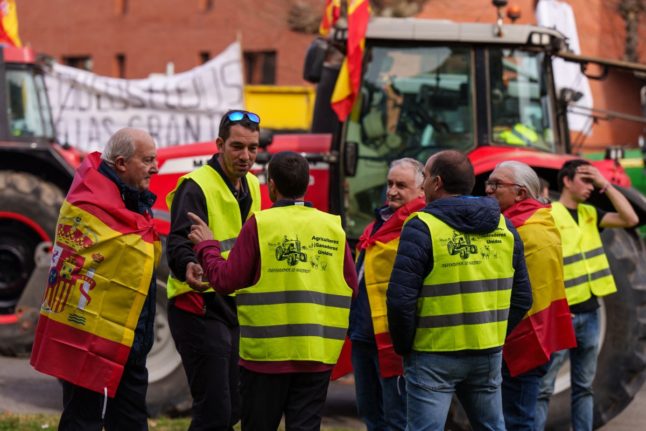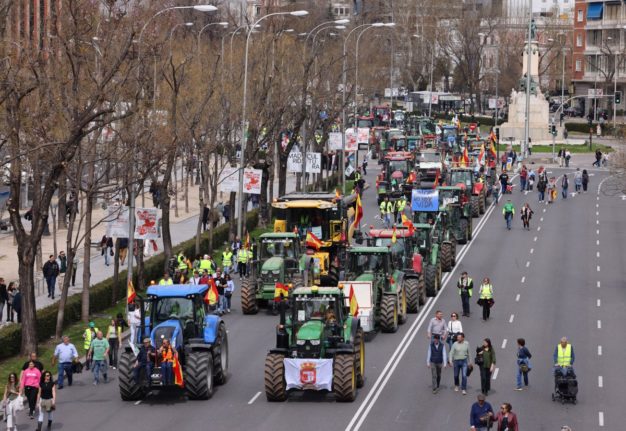The organisation leading the protests by Spanish agricultural sector workers, Platform 6-F, has called for the resignation of Interior Minister Fernando Grande-Marlaska, against whom the group also pledged to take legal action following clashes between police and protestors last week.
This comes as the farmers’ protests move into their second week on Monday with Spanish hauliers have also pledged an indefinite walkout.
The protests continued to cause traffic problems around the country on Monday.
Farmers plan to maintain their street protests across the country for at least the rest of February, according to the updated schedules of different agricultural groups and organisations.
Speaking in a press conference in Madrid on Monday afternoon, 6-F’s legal spokesman Xaime da Pena Gutiérrez said: “There is a contradiction on the part of the government, since it is talking about the protests being legitimate, but then it acts as if they were not.”
READ ALSO: EXPLAINED: Why are farmers in Spain protesting?
Gutiérrez insisted that the 6-F Platform “demands for the resignation of Marlaska” and highlighted mixed messaging coming from the government.
Farmers are not the only group asking for Marlaska’s resignation today, though for very different issues. While Gutiérrez spoke with the press, much of the Spanish right spent Monday also calling on Marlaska to resign following the deaths of two guardia civil agents chasing drug traffickers in southern Spain over the weekend.
The 6-F legal spokesman went on to say that the organisation will not only take legal action against Marlaska but, if necessary, also against the police force following violent clashes over the weekend.
“We are going to report the agents who beat people, of which there were more than 30,” the spokesman said.
6-F claims that more than 60 people were injured in clashes with police in Madrid on Saturday, when tractors parked in front of the Metropolitano stadium.
“The instructions from the Ministry of the Interior were to act forcefully and beat the farmers. It can’t be allowed. We are going to take forceful legal action as well. It will be proven that there are more than 60 injured,” Gutiérrez added.
He also hinted at a change in tactics, moving away from blocking infrastructure with tractors and trucks towards the use of animals.
“The physical safety of farmers must prevail. That’s why Platform 6-F is going to change its strategy: today there are animals walking on the roads, and let’s see if that’s how the animals are protected. 4,000 sheep in Castilla-La Mancha are very difficult to stop. We demand to sit down with the government,” he reiterated again.
Police are also considering investigating Lola Guzmán, leader of the 6-F Platform, for an alleged hate crime after she stated publicly that she wished ETA, the now defunct Basque terror group, had killed more police officers. The comments were made in the aftermath of the police charge against protestors in Madrid on Saturday.
Provisional farmers’ protest calendar
The demonstrations will go on until at least the end of February, though it is worth noting that 6-F is not formally aligned with trade unions, who have called their own protests and walkouts. Smaller, local agricultural groups could also stage their own demonstrations.
READ ALSO: How long will the farmers’ roadblocks in Spain last?
In Granada, for example, agricultural organisations Asaja, COAG and UPA, together with Agroalimentary Cooperatives (Faeca), have already announced mobilisations lasting until at least the end of May, which will include approximately fifteen different days of action.
As of 16:00 on Monday 12th February, the protests provisionally confirmed are:
- Tuesday 13 February: Farmers in La Rioja and Zaragoza will take to the roads and there will be protests called by Unión de Uniones in the ports of Tarragona and Santander.
- Wednesday 14 February: Demonstrations are planned in Toledo, Guadalajara, Jaén, Seville, Palencia, Soria and Santa María La Real de Nieva (Segovia).
- Thursday 15 February: Castellón and Boceguillas (Segovia).
- Friday 16 February: Unión de Uniones has called for demonstrations in Venta Pinillas (Segovia).
- Wednesday 21 February: Unión de Uniones also plans to carry park tractors outside Spain’s Ministry of Agriculture, Fisheries and Food in Madrid, and the Asaja, COAG and UPA unions have called for action in Murcia.
- Thursday 22 February: Protests in Aragón, Cádiz and in the port of Valencia.
- Friday 23 February: What is (for now) scheduled to be the final day of demonstrations will take place in León.



 Please whitelist us to continue reading.
Please whitelist us to continue reading.
Member comments